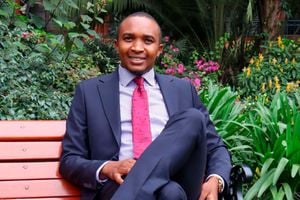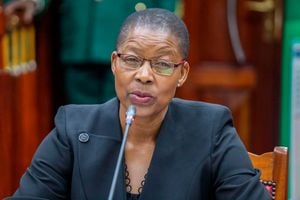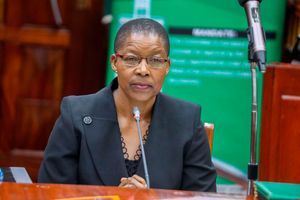
Lawyers and civil rights activists carrying banners and placards at The Supreme Court on January 12, 2024, protesting against President Ruto’s recent attacks on the Judiciary. PHOTO
Learned friends run the country. Well, that is what some observers feel, pointing to the number of positions in Kenya whose holders are experienced lawyers.
The debate has been revived in recent weeks following the introduction of a Bill before the National Assembly seeking to amend the existing law with a new proposal requiring the chairperson of the Ethics and Anti-Corruption Commission (EACC) to have qualifications fit for a judge of the High Court.
This means all applicants to be considered for the post must be lawyers, if the changes are approved.
The amendment was introduced by Majority Leader in the National Assembly Kimani Ichung’wah and Minority Leader Opiyo Wandayi, who has since relinquished his position after being appointed Energy Cabinet Secretary.
“The chairperson of the commission shall be a person who is qualified to hold the office of a judge of the High Court under the Constitution,” reads the amendment in part.
The proposed change has been rejected by the National Council of Churches of Kenya (NCCK), which says it is restrictive.
In an August 23 press briefing, the NCCK said: “We demand that the National Assembly withdraw the Ethics and Anti-Corruption Amendment Bill, 2024. The Parliament must not use this to fight the commission (EACC) for standing against corruption, especially the withdrawal of corruption cases by the DPP (Director of Public Prosecutions).”
The current EACC chair, David Oginde, and his predecessor, Eliud Wabukhala, are clergymen— something that could have informed NCCK’s position.
Every position that requires a candidate to have the same qualifications needed for a judge imply that a law degree is a must. According to the Constitution, one of the requirements for being a judge in Kenya is having “a law degree from a recognised university”.
Some of those that expressly require lawyers include the Director of Public Prosecutions, Attorney General, one member of the National Police Service Commission and tribunals appointed to look into matters touching on constitutional commissions.
There has also previously been criticism that the Judicial Service Commission is dominated by lawyers. Others set out in laws made by Parliament include the chair of the Independent Electoral and Boundaries Commission.
With President William Ruto’s reconstituted Cabinet containing a sizeable number of learned friends – they are 10 in total, comprising almost half the Cabinet – legal minds have never been more pivotal in the governance structure.
Even though it is not a restrictive requirement, speakers of Parliament, particularly in the multiparty era since 1992, have also invariably been lawyers. The trend is replicated in many county assemblies.
All these beg the question: are too many positions in government designed for lawyers and did the 2010 Constitution entrench this?
Former Law Society of Kenya President Eric Theuri does not think so.
“I think it's largely a misconception, and I think it arises from the fact that in this country we have a bias against professionalism,” said Mr Theuri.
“There are some functions that require a very good understanding of the intricacies of the law, and those functions are best exercised by someone who has a good understanding of the legal environment. Whereas someone can take legal advice, you do not want a situation where, before anyone makes any decision on anything, they are always rushing back to their lawyers to be given legal advice,” he added.
Lawyer Bobby Mkangi, one of the nine experts in the committee that drafted the 2010 Constitution, told Nation Africa that except for a few positions like the Attorney-General, the Director of Public Prosecutions and officers in the justice system where the supreme law created a requirement that holders have a law background, there is no such restriction in most other roles.
“Specific professional and academic qualifications are contained in attendant and respective pieces of legislation,” he said.
Commenting on the proposal to have the EACC boss coming from a legal background, Mr Mkangi noted that it will match the rigours of the position.
“Being a lawyer can be an added advantage because the chairperson is required to exercise a quasi-judicial role,” said Mr Mkangi. “But it should not be a categorical requirement.”
Mr Theuri supports that view.
“EACC (chairpersonship) is about being able to guide investigators, to receive complex reports on investigations, to make a determination whether the threshold for determining that an offence has been committed has been reached,” he said. “Most of those recommendations would be touching on the legal threshold.”
He went on: “You do not want to send somebody who is representing EACC to a meeting and when complex issues of law arise, that person cannot make sound proposals or responses or whatever, until they go and talk to their lawyers.”
Mr Mkangi said there are positions that are not reserved for people with a legal training but they are occupied by lawyers as a matter of tradition.
“Regarding the position of Speaker, it is not categorically spelt out that he or she must be a lawyer. But conventionally – and I think because of the nature of the office’s mandate – it has become a tradition that it is lawyers who get elected to the office. It is not a constitutionally prescribed requirement,” said Mr Mkangi.
He pointed out that this is not a situation unique to Kenya, giving the example that “out of 45 US presidents, 27 were lawyers; yet this is not a constitutional requirement”.
“There is just something that gravitates statecraft to the legal profession and vice versa to the extent that it is eventually believed that it is by fiat whereas it is not,” he said.
Among the constitutional commissions, qualifications for the chairperson differ. To head the National Land Commission, a person needs 15 years of experience in fields such as public administration, land management, management of natural resources, land adjudication and settlement, land law, social sciences, among others.
To chair the Commission on Revenue Allocation, one needs professional experience in financial and economic matters of at least 15 years.
To chair the Salaries and Remuneration Commission, a university degree is required plus knowledge in fields such as public management, finance and administration, human resource management, economics, labour laws, among others.
To be the chair of the National Police Service Commission, one needs a university degree, needs to satisfy Chapter Six of the Constitution and should not have been in the police service.
In the case of EACC chair, a person needs a university degree and 15 years of experience in a multitude of fields (11 as per the Act) that include ethics and governance, law, economics, audit, accounting, public relations and media, or religious studies or philosophy. This is set to be narrowed down if the Bill becomes law.
However, some commissions specify that the holder should have a law background.
Regarding the Kenya National Human Rights Commission, for instance, the chairperson must have “knowledge and at least 15 years’ experience in matters relating to law and human rights” as per the relevant Act.
In the case of the Independent Electoral and Boundaries Commission, the chair “shall be a person who is qualified to hold the office of judge of the Supreme Court under the Constitution” according to the IEBC Act.
Mr Theuri feels Kenya can do with more professionals in many positions.
“We have serious governance issues because people don’t take our professionals seriously and do not want to match an institution’s mandate with the people who are being appointed to those offices,” he said.
He added: “Even in a place like Parliament, if you have more lawyers and if you have more professionals, then you have people who are able to guide the country when it comes to the law-making process.”











